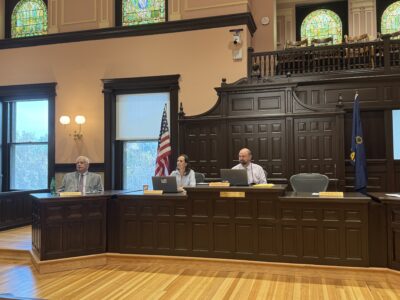After years of chaos and scandal, Regents believe proposal to let Haskell govern itself ‘enables the University to thrive’

photo by: Shawn Valverde
Haskell Indian Nations University is pictured on Saturday, Dec. 21, 2024.
In three years on Haskell Indian Nations University’s Board of Regents, board president Brittany Hall has watched her alma mater seemingly spin out of control — and has had almost no power to do anything about it.
She’s watched as the school was rocked by allegations of fraud, nepotism, sexual assaults, intimidation and more. She’s been there through multiple Haskell presidents and through the entire Bureau of Indian Education investigation that was initiated in 2022 — an investigation that eventually led to a bipartisan group of lawmakers chastising the BIE, which administers Haskell, during a July 2024 congressional hearing.
But the 15-member Board of Regents hasn’t been able to intervene in any of this, Hall said, because it has no real authority to set policies at the university or oversee its staff. According to a statement from the board on Aug. 2, 2024, the Board of Regents “advises the University president on policy issues as requested, but is not involved in the direct management of the school.”
And, as for the dramatic congressional hearing? Hall told the Journal-World that she wasn’t informed of it until “maybe two weeks before.”
“It’s been difficult,” said Hall, a member of the Shawnee Tribe who’s entering her fourth year on the board.

photo by: Submitted
Brittany Hall
But now, Hall sees new hope in a proposal from two Kansas Republicans in Congress. U.S. Sen. Jerry Moran and U.S. Rep. Tracey Mann, who represents the 1st District, which includes Lawrence, have proposed federal legislation that would remove Haskell from the BIE’s control and let the university govern itself while still receiving federal funding, as the Journal-World reported.
The draft plan would empower the Board of Regents to establish all policies of the university, monitor departments, create new departments and appoint the president. If it becomes a reality, Hall and other leaders hope it will allow Haskell to better plan for its future. While it’s mostly been a “good experience” working with the BIE, Hall said, there have been too many negatives stemming from the Regents’ lack of control.
“(This change) enables the University to thrive while better serving its students and communities,” Hall said.
• • •
Haskell, which was initially founded in 1884 as a boarding school for assimilating Native children, has always been run by the federal government.
Under the current structure, it’s the BIE, a division of the Department of the Interior, that’s in charge of administering the university. The Board of Regents has a memorandum of understanding with the BIE and the university itself, in which the Regents’ role is “to reflect the opinions and needs of our Tribal governments” and to support Indigenous educational philosophies for the students.
The Regents have long advocated for changing how the university is governed, Hall told the Journal-World. She said the university and the Regents have had discussions about seeking more autonomy “for many years” before she joined the board.
But it was only this year that the push for self-governance gained momentum.
“I don’t believe the pursuit of (self-governance) has gotten as far as it has before this,” Hall said.
One of the major catalysts was the 80-page report that resulted from the BIE’s investigation of alleged misconduct at Haskell.
That document, as the Journal-World has previously reported, had a complicated and opaque history. It wasn’t released to the public or the media until April 2024, but it is dated Jan. 13, 2023, and investigators submitted it to the BIE’s human resources officer on Nov. 7, 2022.
When it was released, it described Haskell as an institution that is “severely dysfunctional and severely lacking processes and procedures.” Among other things, it touched on sexual assault allegations involving Haskell employees and students; allegations of theft and fraud, including theft of athletic gear; and incidents where students reported being bullied, intimidated and harassed by administrators.
The latter allegations involved student-athletes who were required to sign a no-contact agreement barring them from communicating with anyone — including their parents — about allegations lodged against their former cross country coach, Clay Mayes. Two student-athletes quoted in the report said that some individuals on campus have “the power to intimidate people” and “If you have connections to different staff around HINU, you are untouchable.”
In May 2024, the month after the report was made public, the Board of Regents unanimously voted to start the process of exploring what self-governance would look like, Hall said.

photo by: Chad Lawhorn/Journal-World
U.S. Sen. Jerry Moran, R-Kansas, is pictured at the University of Kansas on Nov. 7, 2024.
At around the same time, Moran was demanding accountability from the BIE too.
In late April, after the report was made public, Moran sent a letter to Interior Secretary Deb Haaland saying that the university was in “urgent need for a systemic overhaul.” He asked for a report from Interior regarding the situation at Haskell within two weeks — by May 8 — but the department missed that deadline.
• • •
Then came the hearing in July, at which Mayes and former Haskell President Ronald Graham described the culture at Haskell as lacking accountability and being replete with cliques, backstabbing, nepotism and bullying. Both men had been fired from their jobs at Haskell, though Mayes had later been reinstated, and Graham launched a federal appeal for his reinstatement in May 2024.
Graham testified that the environment at Haskell was “just chaos all the time,” and Mayes said the school had an almost “ganglike” atmosphere. Mayes alleged that there was large-scale theft of athletic equipment going on and that the school refused to listen to women reporting sexual assault. Both men said that their own attempts to alert the BIE to these issues had been met with silence or even hostility.
Members of Congress said they still hadn’t received an unredacted copy of the report, and they grilled Bryan Newland, the assistant secretary of the Bureau of Indian Affairs, about his department’s lack of responsiveness. He didn’t seem to have an answer for why it took multiple Freedom of Information Act requests and a lawsuit before the report was released; he merely said, “Our team did not handle that as well as we should have.”
The congressional response was scathing. Rep. Mark Takano, D-California, said he was “frankly appalled by the lack of transparency and accountability that BIE schools are subjected to,” and Rep. Harriet Hageman, R-Wyoming, said, “We need to fix it and fix it now.” Rep. Melanie Stansbury, D-New Mexico, summed it up: “There’s a toxic culture at Haskell, period.”
All of this was a shock to Hall and the Regents, as well.
“We have been aware that complaints have been made by many Haskell students and alumni in recent years, but were not aware of the depth of the allegations made at the hearing,” Hall wrote in the Regents’ statement in August. “We support a full review and urge Interior Department officials to take immediate corrective action.”
• • •
It remains to be seen whether the proposal from Moran and Mann can translate Congress’ outrage into real change. The legislators hope they can introduce the legislation later this year, but some of the contours of the proposal have already taken shape.
For one thing, the proposal says the federal government would continue funding the school to “affirm the treaty and trust responsibility of the federal government to Indians.” The U.S. Department of the Interior would provide an annual grant and “related assistance” to the university; in the current draft, Haskell would receive $21 million per year from the federal government for its operations, with the number possibly increasing.
Among the other things Moran and Mann are proposing are:
• Establishing Haskell as a “federally chartered educational institution.” That would mean that Haskell would have the tax status of a charitable organization and would be allowed to accept private donations.
• Requiring the U.S. Department of Interior to transfer ownership of Haskell’s 320-acre campus to the university. The university, however, would not have the ability to sell any of that property, and it could only be used for activities directly related to the mission of the university.
• Classifying Haskell employees not as federal civil servants, but employees of the university. They would still be eligible for federal benefits, and the university would be required to make payments in the federal health and retirement programs, the same as other federal agencies. The university, for purposes of law, would be treated as a federal agency.
• Requiring that Lawrence be maintained as the general location of the university, although the Regents would have the authority to create branches or additional locations.
For some of the Regents — like Joseph Rupnick, a Regent who is chairman of the Prairie Band Potawatomi Nation — the changes that Moran and Mann are seeking can’t come soon enough.
“This bill can safeguard Haskell’s future and its funding,” Rupnick said.
But right now, the Kansans in Congress still have a lot of work to do. They’re currently seeking feedback on the legislation, especially from members of the Native American, higher education and Lawrence communities. Members of the public are asked to provide feedback on the proposal by sending comments to feedback@moran.senate.gov by Feb. 1.
“It’s imperative that those most directly impacted have a welcome, active voice in helping us enact this change,” Mann said.

photo by: Contributed
Tracey Mann







